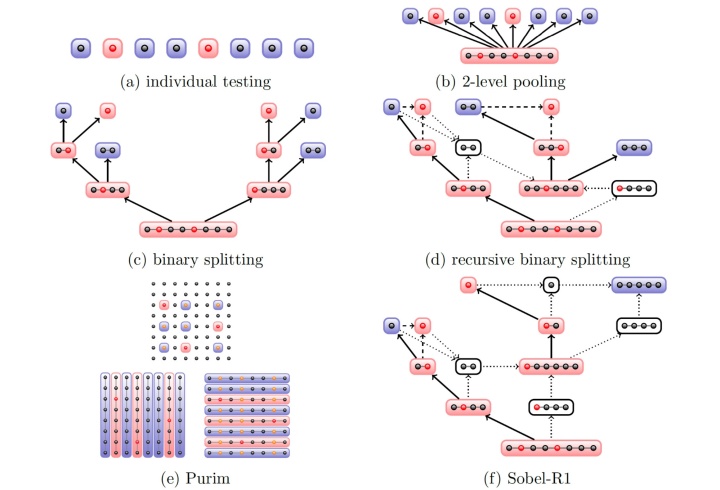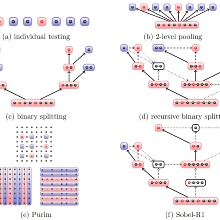With the help of so-called pooling procedures, samples from different people can be combined into a pool and tested for Covid-19 collectively in a single test kit. An interdisciplinary team of mathematicians, computer scientists and medical doctors from the Junge Akademie, the Technische Universität Braunschweig, the Universität Stuttgart and the company Arctoris has developed a decision support tool that calculates which method is most effective in identifying all Covid-19 patients in a positive sample pool. Their simulations show that in Germany, pool-based test methods can be about eight times more efficient than individual tests at a low infection rate. The team recently published the results in a preprint on "arXiv" and as a website.
In sample pooling, the sample material of different people is combined into one sample (pool) and tested together. This can save time and test capacities when the infection rate is low compared to individual testing. If the sample is negative, none of the individual samples contained in the pool need to be tested separately. If the result is positive, further tests are performed. Depending on the scenario, different procedures are suitable for this.
Mathematical decision support
The researchers simulated a total of five different pool testing procedures and individual testing using a mathematical modelling approach for five countries. They took into account parameters such as infection rate, test characteristics, population size and test capacities. Based on these parameters, algorithms calculate which of the pooling methods is most effective in each case.
The comparative analysis is intended to serve as a decision-making aid for laboratories and political decision-makers. In addition, the team has developed an interactive website on which scenarios for other countries or cities can also be modelled.
"What is new about our approach is the comparison between the various existing test strategies and the recommendation of which procedure would be most suitable in a given situation in order to identify a maximum number of sick people in the shortest possible time with limited resources," says Professor Timo de Wolff from the Technische Universität Braunschweig and member of the Junge Akademie, who initiated the project. The pool testing approach has been used in medicine for several decades, for example for testing blood donations for viruses. Recently, it was shown in the laboratory that such test methods are also possible for Covid-19. With regard to Covid-19 testing, this approach is currently being taken up in a number of preprints.

About eight times more efficient
In the preprint now published, the researchers show that pool-based testing procedures can be about eight times more efficient than individual tests in current scenarios at an infection rate of 1 percent. At such a low infection rate, one tenth of the German population could be tested for Covid-19 within approximately 10 days using realistic and optimised pool testing strategies. Pool-based testing strategies can also greatly reduce the number of false-positive diagnoses.
With the help of such approaches, broad testing within a population would be possible, in particular to quickly identify symptom-free patients. However, their effectiveness decreases with increasing infection rates, which is why their application is particularly useful in cases of low infection rates.
About the project
In their publication, the researchers have simulated situations in the USA, Germany, Great Britain, Italy and Singapore to reflect a wide variety of population sizes and test capacities. The project involves Professor Timo de Wolff and Janin Heuer, TU Braunschweig, Professor Dirk Pflüger and Michael Rehme, Universität Stuttgart, and Dr. Dr. Martin-Immanuel Bittner, Arctoris, Oxford. Timo de Wolff, Dirk Pflüger and Martin-Immanuel Bittner are members of the Junge Akademie. The preprint and the code are publicly accessible. The interactive website can be found here.
The project was financed by the Junge Akademie. The publication has so far appeared as a preprint on "arXiv" and is available here.
De Wolff, Timo; Pflüger, Dirk; Rehme, Michael; Heuer, Janin; Bittner, Martin-Immanuel: Evaluation of Pool-based Testing Approaches to Enable Population-wide Screening for COVID-19 (arXiv:2004.11851).
Participating project partners
Technische Universität Braunschweig
With more than 20,000 students and 3,700 employees, the Technische Universität Braunschweig is the largest technical university in northern Germany. It stands for strategic and performance-oriented thinking and acting, relevant research, committed teaching and the successful transfer of knowledge and technologies to business and society. Our core research areas are Mobility, Infections and Therapeutics, Metrology and the Future City. Strong engineering and natural sciences form our core disciplines. These are closely linked with economics and social sciences, humanities and education. The campus is located in one of the most research-intensive regions of Europe. The TU Braunschweig works just as successfully with the more than 20 research institutions in our neighbourhood as it does with its international partner universities and cooperation partners.
Universität Stuttgart
The Universität Stuttgart is one of the leading technically oriented universities in Germany with global significance. It sees itself as a center of university-based, non-university, and industrial research. Furthermore, it takes a role as a guarantor of research-based teaching, focused on quality and holism. The university promotes the transfer of knowledge and technologies to society in all their profile- and competence areas as well as their emerging fields. The „Stuttgarter Weg” (Stuttgart Way) means an interdisciplinary integration of engineering, natural sciences, humanities, and social sciences based on the fundamentals of cutting-edge research at a disciplinary level. Our vision is "Intelligent systems for a sustainable society".
Arctoris
Arctoris Ltd is an Oxford based technology company in the field of life science research. Arctoris has established the world's first fully automated drug discovery platform, providing validated and optimized experiment-as-a-service to biotechnology companies, pharmaceutical companies and universities. Scientists worldwide can configure experiments in cell and molecular biology as well as biochemistry online and have them carried out by robots in the Arctoris research facility. Thus Arctoris enables faster, better and more efficient research for partners and customers worldwide.
Junge Akademie
The Junge Akademie was founded in 2000 as the world's first academy for outstanding young scientists. Its members come from all scientific disciplines as well as from the artistic field - they sound out the potential and limits of interdisciplinary work in ever new projects, want to bring science and society into dialogue with each other and give new impetus to the science policy debate. The Hunke Akademie is jointly supported by the Berlin-Brandenburg Academy of Sciences and Humanities (BBAW) and the German National Academy of Sciences Leopoldina. The office is located in Berlin.
Expert Contact:
Prof. Dr. Timo de Wolff
Technische Universität Braunschweig
Institute for Analysis and Algebra
Universitätsplatz 2 38106 Braunschweig
Phone: +49 (0) 531 391-7503
Email
www.iaa.tu-bs.de/timodewolff/
Prof. Dr. Dirk Pflüger
Universität Stuttgart
Institut of Parallel and Distributed Systems
Universitätsstr. 38
70569 Stuttgart
Tel. +49 (0) 711 685-88447
E-Mail
https://www.f05.uni-stuttgart.de/fakultaet/personen/Pflueger-00005/
Dr. Dr. Martin-Immanuel Bittner
Arctoris Ltd
9400 Garsington Road
Oxford OX4 2HN
Vereinigtes Königreich
Tel. +44 (0) 7713 828 576
E-Mail
https://www.arctoris.com/
The publication has so far appeared as a preprint on "arXiv". Preprints are publications that have not yet undergone the peer review process of a publishing house or a journal. This way, the results are sooner available for scientific use. A peer review process will follow.


